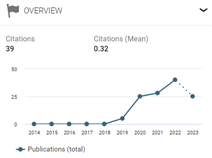Hubungan hygiene, sanitasi lingkungan dan asupan protein dengan infeksi kecacingan pada balita usia 24-59 bulan di Kabupaten Aceh Tengah
DOI: 10.30867/gikes.v5i2.1623Abstract
Background: Soil transmitted helminth(STH) infection is an infection caused by a group of nematode worms that is transmitted through parasite larvae or eggs that develop in the soil and then come into direct contact with humans. Helminth infections have a relationship with hygiene practices and environmental sanitation, in addition to adequate nutritional intake that makes the body's immune system strong so that it can prevent and fight infections, one of these important nutrients is protein.
Objectives: To analyze the relationship between hygiene, environmental sanitation and protein intake on helminthiasis infection among toddlers aged 24-59 months
Methods: Analytical research using a cross-sectional study in Atu Lintang District, Central Aceh Regency conducted in August-September 2023. The subjects used in this study were toddlers aged 24-59 months as many as 100 toddlers whose sampling used purposive sampling method. Data were collected by observation and interviewing the hygiene questionnaire, environmental sanitation and Semi quantitative Food Frequency Questionnaire (SQ-FFQ) to determine the adequacy of protein intake. Stool sample examination using the Kato Katz method. Data were analyzed using the Fisher Exact test with a significance level of 95%.
Results: The results showed that 9% of toddlers were infected with STH and 91% were not infected with STH. Hand washing (p=0,002) and nail hygiene (p=0,000) were significantly associated with STH infection while footwear use (p=1,000), environmental sanitation (p=0,086) and protein intake (0.078) showed no significant association.
Conclusion: In this study, the hygiene practices of hand washing and nail hygiene had a significant association with helminthiasis infection.
Keywords
Full Text:
PDFReferences
Agustaria, G., Fazidah, A. S., & Nurmaini, N. (2019). The relationship of gender, school sanitation and personal hygiene with helminthiasis at juhar karo regency in North Sumatera Province, Indonesia. Open Access Macedonian Journal of Medical Sciences, 7(20), 3497–3500. https://doi.org/10.3889/oamjms.2019.686
Al Rahmad, A. H., Ichsan, I., Imran, H., & Miko, A. (2023). Mendorong pilihan jajanan sehat pada anak-anak sekolah: Pengalaman pengabdian kepada masyarakat di Desa Panteriek, Banda Aceh. Jurnal PADE: Pengabdian & Edukasi, 5(1), 5–10. https://doi.org/10.30867/pade.v5i1.1330
Badriyah, L., & Syafiq, A. (2017). The Association Between Sanitation, Hygiene, and Stunting in Children Under Two-Years (An Analysis of Indonesia’s Basic Health Research, 2013). Makara Journal of Health Research, 21(2). https://doi.org/10.7454/msk.v21i2.6002
Campbell, S. J., Nery, S. V., D’Este, C. A., Gray, D. J., McCarthy, J. S., Traub, R. J., Andrews, R. M., Llewellyn, S., Vallely, A. J., Williams, G. M., Amaral, S., & Clements, A. C. A. (2016). Water, sanitation and hygiene related risk factors for soil-transmitted helminth and Giardia duodenalis infections in rural communities in Timor-Leste. International Journal for Parasitology, 46(12), 771–779. https://doi.org/10.1016/j.ijpara.2016.07.005
Hesham Al-Mekhlafi, M., Surin, J., Atiya, A. S., Ariffin, W. A., Mohammed Mahdy, A. K., & Che Abdullah, H. (2008). Pattern and predictors of soil-transmitted helminth reinfection among aboriginal schoolchildren in rural Peninsular Malaysia. Acta Tropica, 107(2), 200–204. https://doi.org/10.1016/j.actatropica.2008.05.022
Makata, K., Ensink, J., Ayieko, P., Hansen, C., Sichalwe, S., Mngara, J., Mcharo, O., Mazigo, H., Seni, J., Dreibelbis, R., Rockowitz, S., Okello, E., Grosskurth, H., Kinung’hi, S., & Kapiga, S. (2021). Hand hygiene intervention to optimise soil-transmitted helminth infection control among primary school children: the Mikono Safi cluster randomised controlled trial in northwestern Tanzania. BMC Medicine, 19(1), 1–13. https://doi.org/10.1186/s12916-021-01987-6
Mationg, M. L. S., Williams, G. M., Tallo, V. L., Olveda, R. M., Aung, E., Alday, P., Reñosa, M. D., Daga, C. M., Landicho, J., Demonteverde, M. P., Santos, E. D., Bravo, T. A., Bieri, F. A., Li, Y., Clements, A. C. A., Steinmann, P., Halton, K., Stewart, D. E., McManus, D. P., & Gray, D. J. (2021). Soil-transmitted helminth infections and nutritional indices among Filipino schoolchildren. PLoS Neglected Tropical Diseases, 15(12), 1–20. https://doi.org/10.1371/journal.pntd.0010008
Merisa Damanik, D., Soeyoko, S., & Sutomo, A. H. (2014). Sanitation of House and School, Personal Hygiene and Infection of Soil Transmitted Helminths among Elementary School Students. International Journal of Public Health Science (IJPHS), 3(1), 43. https://doi.org/10.11591/ijphs.v3i1.4673
Nasution, R. K. A., Nasution, B. B., Lubis, M., & Lubis, I. N. D. (2019). Prevalence and knowledge of soil-transmitted helminth infections in Mandailing Natal, North Sumatera, Indonesia. Open Access Macedonian Journal of Medical Sciences, 7(20), 3443–3446. https://doi.org/10.3889/oamjms.2019.441
Nugraha, T. I., Semiarty, R., & Irawati, N. (2019). Hubungan Sanitasi Lingkungan dan Personal Hygiene Dengan Infeksi Soil Transmitted Helminths (STH) pada Anak Usia Sekolah Di Kecamatan Koto Tangah Kota Padang. Jurnal Kesehatan Andalas, 8(3), 590. https://doi.org/10.25077/jka.v8i3.1046
Pane, R., Nurmaini, & Sri Andayani, L. (2020). Relationship between the Cleanliness of Nails and the Usage of Footwear with the Incidence of Helminths Infections on Elementary Student in Sibolga of 2019. Britain International of Exact Sciences (BIoEx) Journal, 2(1), 45–52. https://doi.org/10.33258/bioex.v2i1.107
Rahmi, S., Chairil Anwar, Hamzah Hasyim, Ramzi Amin, & Ahmad Ghiffari. (2021). The Correlation of No Footwear Use and Soil Helminth Incidence among Elementary School Children in Musi Rawas, South Sumatera, Indonesia. Bioscientia Medicina : Journal of Biomedicine and Translational Research, 5(4), 1045–1050. https://doi.org/10.32539/bsm.v5i4.381
Ramadhani Nasution, S. L., Nasution, A. N., Suhartomi, & Nasution, S. W. (2019). The Effect of Habits on Wearing Footwear and hand washing after playing on the ground Against Worms in Primary School Al-Wasliyah in Medan Deli. Journal of Physics: Conference Series, 1230(1). https://doi.org/10.1088/1742-6596/1230/1/012049
Salma, Z., Fitriah, F., Renaldy, R. B. Y., Rossyanti, L., Sarjana, Iw., Pasulu, S. S., Budiono, B., Gunadi Ranu, I. G. M. R., Husada, D., & Basuki, S. (2021). Soil-Transmitted Helminthes Infection and Nutritional Status of Elementary School Children in Sorong District, West Papua, Indonesi. Indonesian Journal of Tropical and Infectious Disease, 9(2), 84. https://doi.org/10.20473/ijtid.v9i2.24202
Sandy, S., & Kridningsih, T. N. (2023). Source of household water as main risk factor of soil-transmitted helminth infections among elementary school pupils in Wamena District, Jayawijaya Regency, Papua. Universa Medicina, 42(2), 160–172. https://doi.org/10.18051/univmed.2023.v42.160-172
Sari, M. P., Nathasaria, T., Majawati, E. S., & Pangaribuan, H. U. (2020). Soil-Transmitted Helminth Infections, Anemia, and Undernutrition Among School-Children in An Elementary School in North Jakarta, Indonesia. Majalah Kedokteran Bandung, 52(4). https://doi.org/10.15395/mkb.v52n4.2137
Shang, Y., Tang, L. H., Zhou, S. Sen, Chen, Y. D., Yang, Y. C., & Lin, S. X. (2010). Stunting and soil-transmitted-helminth infections among school-age pupils in rural areas of southern China. Parasites and Vectors, 3(1), 1–6. https://doi.org/10.1186/1756-3305-3-97
Sofiana, L., Gustina, E., Wardani, Y., & Halimatusa’diyah, T. (2020). Environmental Factors and Helminth Infections Among Elementary Students. 24(Uphec 2019), 72–75. https://doi.org/10.2991/ahsr.k.200311.013
Sofiana, L., & Kelen, M. S. J. (2018). Factors Related to Soil Transmitted Helminth Infection on Primary School Children. Unnes Journal of Public Health, 7(1), 55–61. https://doi.org/10.15294/ujph.v7i1.17400
Syahrizal, S. (2022). Hygiene dan sanitasi pada beberapa rumah makan. Studi kasus di Kecamatan Darul Kamal, Aceh Besar. Jurnal SAGO Gizi Dan Kesehatan, 3(2), 150–156. https://doi.org/10.30867/gikes.v3i2.894
Ulayya, T., Kusumastuti, A. C., & Fitranti, D. Y. (2018). Hubungan Asupan Protein, Zat Besi, dan Seng Dengan Kejadian Infeksi Kecacingan Pada Balita Di Kota Semarang. Journal of Nutrition College, 7(4), 177. https://doi.org/10.14710/jnc.v7i4.22277
Vaz Nery, S., Clarke, N. E., Richardson, A., Traub, R., McCarthy, J. S., Gray, D. J., Vallely, A. J., Williams, G. M., Andrews, R. M., Campbell, S. J., & Clements, A. C. A. (2019). Risk factors for infection with soil-transmitted helminths during an integrated community level water, sanitation, and hygiene and deworming intervention in Timor-Leste. International Journal for Parasitology, 49(5), 389–396. https://doi.org/10.1016/j.ijpara.2018.12.006
Wandra, T., Darlan, D. M., Yulfi, H., Purba, I. E., Sato, M. O., Budke, C. M., & Ito, A. (2020). Soil-transmitted helminth infections and taeniasis on Samosir Island, Indonesia. Acta Tropica, 202(August 2019), 105250. https://doi.org/10.1016/j.actatropica.2019.105250
Wikandari, R. J., Setyowatiningsih, L., Djamil, M., Surati, S., & Kahar, F. (2021). Factors Related to Soil Transmitted Helminth Infection in Vegetable Farmers. Indonesian Journal of Medical Laboratory Science and Technology, 3(2), 135–145. https://doi.org/10.33086/ijmlst.v3i2.2145
World Health Organization. (2018). Soil-transmitted Helminth Infections. https://www.who.int/news-room/fact-sheets/detail/soil-transmitted-helminth-infections
Yap, P., Utzinger, J., Hattendorf, J., & Steinmann, P. (2014). Influence of nutrition on infection and re-infection with soil-transmitted helminths: A systematic review. Parasites and Vectors, 7(1), 1–14. https://doi.org/10.1186/1756-3305-7-229
Ziegelbauer, K., Speich, B., Mäusezahl, D., Bos, R., Keiser, J., & Utzinger, J. (2012). Effect of sanitation on soil-transmitted helminth infection: Systematic review and meta-analysis. PLoS Medicine, 9(1). https://doi.org/10.1371/journal.pmed.1001162
Refbacks
- There are currently no refbacks.













